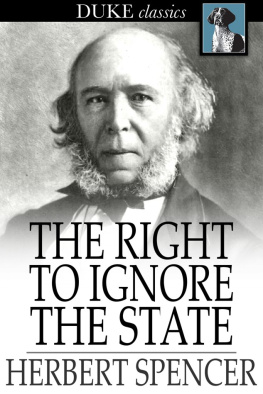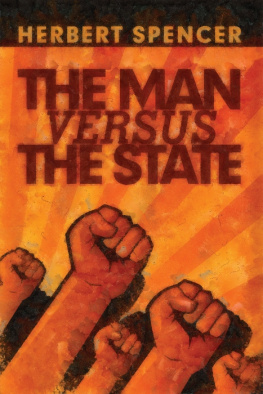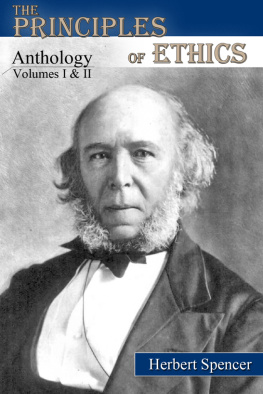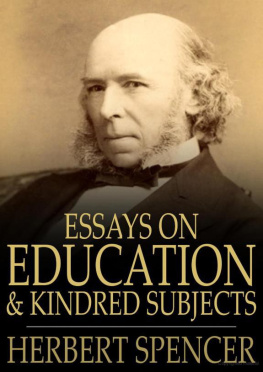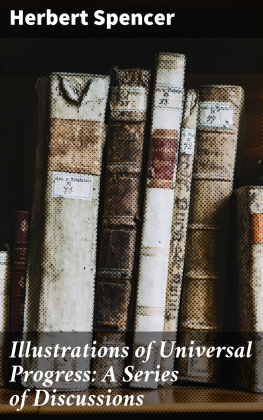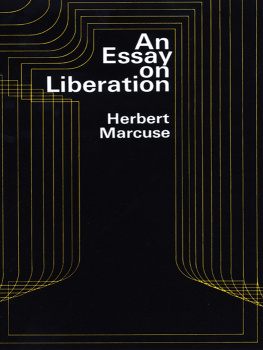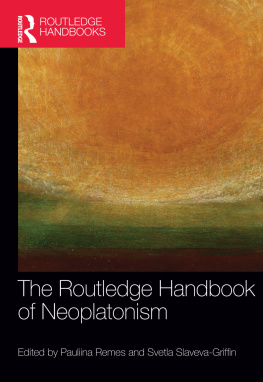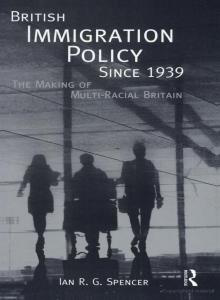Herbert Spencer - The Right To Ignore The State
Here you can read online Herbert Spencer - The Right To Ignore The State full text of the book (entire story) in english for free. Download pdf and epub, get meaning, cover and reviews about this ebook. year: 2014, publisher: Duke Classics, genre: Science. Description of the work, (preface) as well as reviews are available. Best literature library LitArk.com created for fans of good reading and offers a wide selection of genres:
Romance novel
Science fiction
Adventure
Detective
Science
History
Home and family
Prose
Art
Politics
Computer
Non-fiction
Religion
Business
Children
Humor
Choose a favorite category and find really read worthwhile books. Enjoy immersion in the world of imagination, feel the emotions of the characters or learn something new for yourself, make an fascinating discovery.
- Book:The Right To Ignore The State
- Author:
- Publisher:Duke Classics
- Genre:
- Year:2014
- Rating:3 / 5
- Favourites:Add to favourites
- Your mark:
- 60
- 1
- 2
- 3
- 4
- 5
The Right To Ignore The State: summary, description and annotation
We offer to read an annotation, description, summary or preface (depends on what the author of the book "The Right To Ignore The State" wrote himself). If you haven't found the necessary information about the book — write in the comments, we will try to find it.
Do citizens have the right to act as if the government does not exist? Thats the controversial question that British philosopher Herbert Spencer takes on in the thought-provoking essay The Right to Ignore the State. In Spencers view, the answer is a resounding yes. Whether youre a die-hard libertarian or someone who is interested in learning more about that political philosophy, this brief but compelling essay is a solid introduction.
The Right To Ignore The State — read online for free the complete book (whole text) full work
Below is the text of the book, divided by pages. System saving the place of the last page read, allows you to conveniently read the book "The Right To Ignore The State" online for free, without having to search again every time where you left off. Put a bookmark, and you can go to the page where you finished reading at any time.
Font size:
Interval:
Bookmark:

From a 1913 edition
ISBN 978-1-62013-986-8
Duke Classics
2014 Duke Classics and its licensors. All rights reserved.
While every effort has been used to ensure the accuracy and reliability of the information contained in this edition, Duke Classics does not assume liability or responsibility for any errors or omissions in this book. Duke Classics does not accept responsibility for loss suffered as a result of reliance upon the accuracy or currency of information contained in this book.
It is only fair to the memory of Mr. Herbert Spencer that we should warnthe reader of the following chapter from the original edition of Mr.Spencer's "Social Statics," written in 1850, that it was omitted by theauthor from the revised edition, published in 1892. We may legitimatelyinfer that this omission indicates a change of view. But to repudiate isnot to answer, and Mr. Spencer never answered his arguments for the rightto ignore the State. It is the belief of the Anarchists that thesearguments are unanswerable.
1. As a corollary to the proposition that all institutions must besubordinated to the law of equal freedom, we cannot choose but admit theright of the citizen to adopt a condition of voluntary outlawry. If everyman has freedom to do all that he wills, provided he infringes not theequal freedom of any other man, then he is free to drop connection with theState,to relinquish its protection and to refuse paying towards itssupport. It is self-evident that in so behaving he in no way trenches uponthe liberty of others; for his position is a passive one, and, whilstpassive, he cannot become an aggressor. It is equally self-evident that hecannot be compelled to continue one of a political corporation without abreach of the moral law, seeing that citizenship involves payment of taxes;and the taking away of a man's property against his will is an infringementof his rights. Government being simply an agent employed in common by anumber of individuals to secure to them certain advantages, the very natureof the connection implies that it is for each to say whether he will employsuch an agent or not. If any one of them determines to ignore thismutual-safety confederation, nothing can be said, except that he loses allclaim to its good offices, and exposes himself to the danger ofmaltreatment,a thing he is quite at liberty to do if he likes. He cannotbe coerced into political combination without a breach of the law of equalfreedom; he can withdraw from it without committing any such breach; andhe has therefore a right so to withdraw.
2. "No human laws are of any validity if contrary to the law of nature:and such of them as are valid derive all their force and all theirauthority mediately or immediately from this original." Thus writesBlackstone, to whom let all honour be given for having so far outseen theideas of his time,and, indeed, we may say of our time. A good antidote,this, for those political superstitions which so widely prevail. A goodcheck upon that sentiment of power-worship which still misleads us bymagnifying the prerogatives of constitutional governments as it once didthose of monarchs. Let men learn that a legislature is not "our God uponearth," though, by the authority they ascribe to it and the things theyexpect from it, they would seem to think it is. Let them learn rather thatit is an institution serving a purely temporary purpose, whose power, whennot stolen, is, at the best, borrowed.
Nay, indeed, have we not seen that government is essentially immoral? Is itnot the offspring of evil, bearing about it all the marks of its parentage?Does it not exist because crime exists? Is it not strong, or, as we say,despotic, when crime is great? Is there not more libertythat is, lessgovernmentas crime diminishes? And must not government cease when crimeceases, for very lack of objects on which to perform its function? Not onlydoes magisterial power exist because of evil, but it exists by evil.Violence is employed to maintain it; and all violence involves criminality.Soldiers, policemen, and gaolers; swords, batons, and fetters,areinstruments for inflicting pain; and all infliction of pain is, in theabstract, wrong. The State employs evil weapons to subjugate evil, and isalike contaminated by the objects with which it deals and the means bywhich it works. Morality cannot recognise it; for morality, being simply astatement of the perfect law, can give no countenance to anything growingout of, and living by, breaches of that law. Wherefore legislativeauthority can never be ethicalmust always be conventional merely.
Hence there is a certain inconsistency in the attempt to determine theright position, structure, and conduct of a government by appeal to thefirst principles of rectitude. For, as just pointed out, the acts of aninstitution which is, in both nature and origin, imperfect cannot be madeto square with the perfect law. All that we can do is to ascertain,firstly, in what attitude a legislature must stand to the community toavoid being by its mere existence an embodied wrong; secondly, in whatmanner it must be constituted so as to exhibit the least incongruity withthe moral law; and, thirdly, to what sphere its actions must be limited toprevent it from multiplying those breaches of equity it is set up toprevent.
The first condition to be conformed to before a legislature can beestablished without violating the law of equal freedom is theacknowledgment of the right now under discussionthe right to ignore theState.
3. Upholders of pure despotism may fitly believe State-control to beunlimited and unconditional. They who assert that men are made forgovernments and not governments for men may consistently hold that no onecan remove himself beyond the pale of political organisation. But they whomaintain that the people are the only legitimate source of powerthatlegislative authority is not original, but deputedcannot deny the rightto ignore the State without entangling themselves in an absurdity.
For, if legislative authority is deputed, it follows that those from whomit proceeds are the masters of those on whom it is conferred: it followsfurther that as masters they confer the said authority voluntarily: andthis implies that they may give or withhold it as they please. To call thatdeputed which is wrenched from men whether they will or not is nonsense.But what is here true of all collectively is equally true of eachseparately. As a government can rightly act for the people only whenempowered by them, so also can it rightly act for the individual only whenempowered by him. If A, B, and C debate whether they shall employ an agentto perform for them a certain service, and if, whilst A and B agree to doso, C dissents, C cannot equitably be made a party to the agreement inspite of himself. And this must be equally true of thirty as of three: and,if of thirty, why not of three hundred, or three thousand, or threemillions?
4. Of the political superstitions lately alluded to, none is souniversally diffused as the notion that majorities are omnipotent. Underthe impression that the preservation of order will ever require power to bewielded by some party, the moral sense of our time feels that such powercannot rightly be conferred on any but the largest moiety of society. Itinterprets literally the saying that "the voice of the people is the voiceof God," and, transferring to the one the sacredness attached to the other,it concludes that from the will of the peoplethat is, of themajoritythere can be no appeal. Yet is this belief entirely erroneous.
Font size:
Interval:
Bookmark:
Similar books «The Right To Ignore The State»
Look at similar books to The Right To Ignore The State. We have selected literature similar in name and meaning in the hope of providing readers with more options to find new, interesting, not yet read works.
Discussion, reviews of the book The Right To Ignore The State and just readers' own opinions. Leave your comments, write what you think about the work, its meaning or the main characters. Specify what exactly you liked and what you didn't like, and why you think so.

